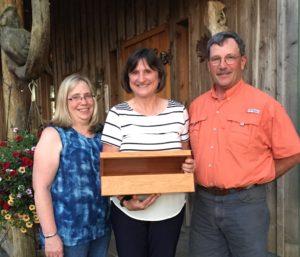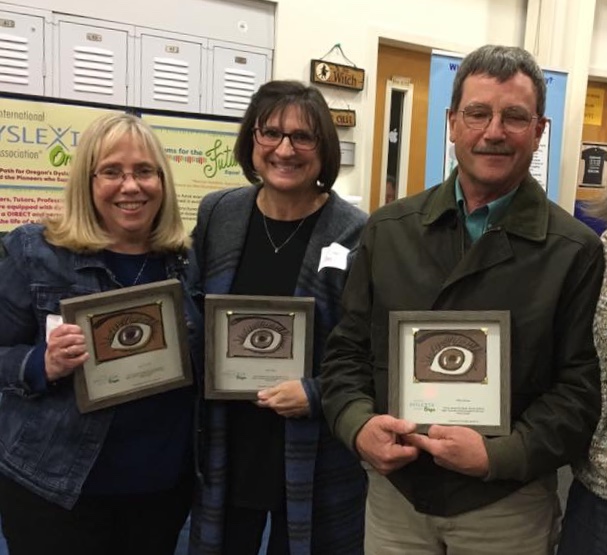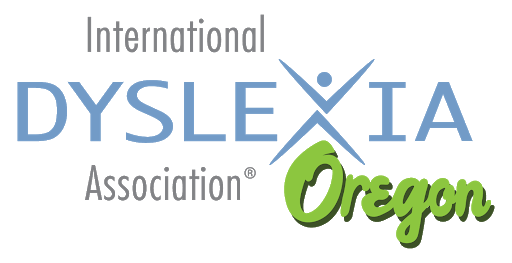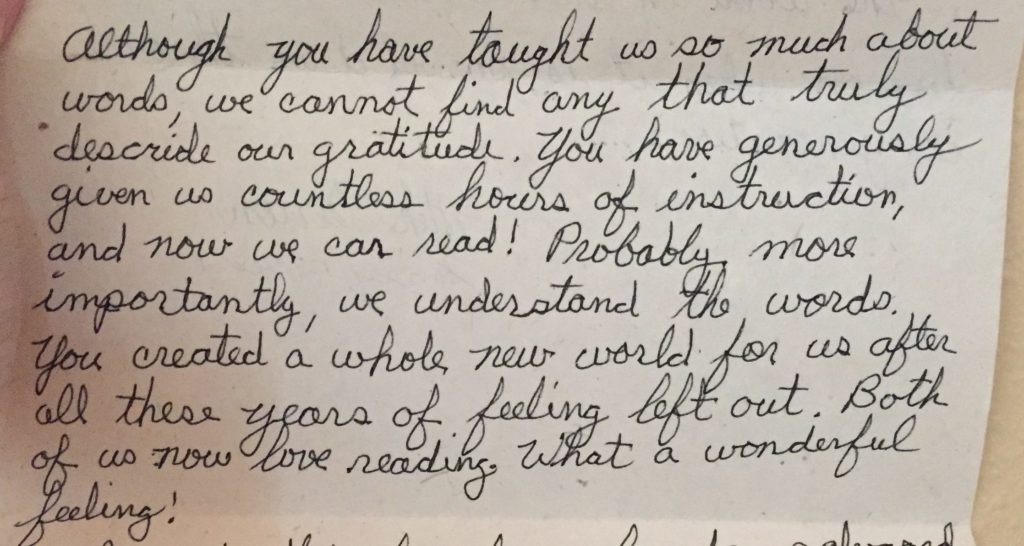“Sandy and Mike were both in their fifties when they decided to give reading one last chance”
Video – It’s Never Too Late.

In 2018, Dr. Pamela Mears created a short documentary, It’s Never Too Late, which shares the heartfelt story of two Oregonians that learned to read in their fifties. This true life story of two adult siblings, Sandy Meade and Mike Herron, will inspire you and lift your spirits. With over three years of proper dyslexia instruction, both Sandy and Mike are reading and writing. They share their story as they want others to know that it is never too late to learn to read. In their words to their teacher “You created a whole new world for us after all these years of feeling left out.”
When dyslexia is in your world, it’s common to feel confused, frustrated or powerless when dealing with the written word. Learning to read is complex. It requires our brains to connect letters to sounds, weave sounds into words, and merge the words together into sentences we can read, write and understand. Dyslexia is common, affecting 15-20 percent of the population. Dyslexia can’t be “cured” – it is lifelong. Some individuals know they are dyslexic, some do not. Some find out early in life, some later in life. Regardless, most everyone at any stage of life can find support to manage their dyslexia.
Dr. Pamela Mears is a Language Arts TOSA (Teacher on Special Assignment) and Literacy Specialist in the Newberg School District near Portland, Oregon. She is a long-time member of the International Dyslexia Association – Oregon Branch.
|
From Dr. Mears… In 2013 I received a phone call from a friend. This friend said we had a mutual friend who couldn’t read and wanted to know if I’d be willing to tutor her. I agreed, and was surprised to learn it was Sandy. I had known Sandy for over 25 years, but didn’t know she couldn’t read. We started meeting behind a locked door at the church building where we attended. We slipped into the room when no one was looking. After about 3 or 4 weeks, she asked if her brother could join us. Mike had done some tutoring in the past, but Sandy talked him in to giving it another try. I met Mike the next week…and off we went starting at the very beginning. As the months passed and they began to share their stories with me, I hoped that someday they would be able to share their experiences with others. After about a year, we began starting class by sharing any “ah-ha’s” that they had during the week. They shared things like: Sandy: I’ve driven the same way to work for years and I finally read the sign I drive by every day…we learned –eigh says /a/. I pass the weigh station. Mike: Last week after learning au says /aw/, I read a sign at work that says “caustic!” I’d never read that sign before. As they continued to share stories about their experiences from how they handled their school years, to hiding their disabilities as adults, and then the experience of learning to read, I knew they had a story that needed to be shared. I would say, “You guys need to make a movie.” But the classroom door continued to be locked. Then, one night one of them said, “We should make a movie!” They were ready to share their secret. They wanted others to know that it is possible for them to learn to read too. Watching Mike and Sandy work so hard to learn to read and hearing their stories has had a huge impact on me….on how I view struggling readers, how I view a simple reading lesson, and how I work with parents and staff. They have definitely changed my life. I hope you enjoy hearing their story. |

|
Thank You Dr. Mears! Recently, Sandy & Mike again showed their appreciation to Dr. Mears for how much the gift of reading has changed their lives. Although you have taught us so much about words, we cannot find any that truly describe our gratitude. You have generously given us countless hours of instruction and now we can read! Probably more importantly, we understand the words. You created a whole new world for us after all these years of feeling left out. Both of us now love reading. What a wonderful feeling!
|
Successful literacy instruction and interventions provide a strong core of highly explicit, systematic teaching of skills such as decoding, vocabulary, comprehension, and writing. For more information please visit:
- Center for Excellence in Reading Instruction: https://effectivereading.org/
- the IDA fact sheet about Structured Literacy™: https://dyslexiaida.org/effective-reading-instruction/
- Structured Literacy™ infographic: https://dyslexiaida.org/what-is-structured-literacy/


